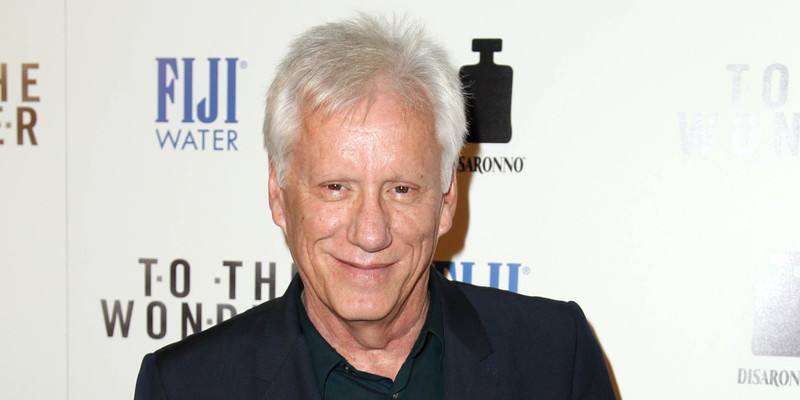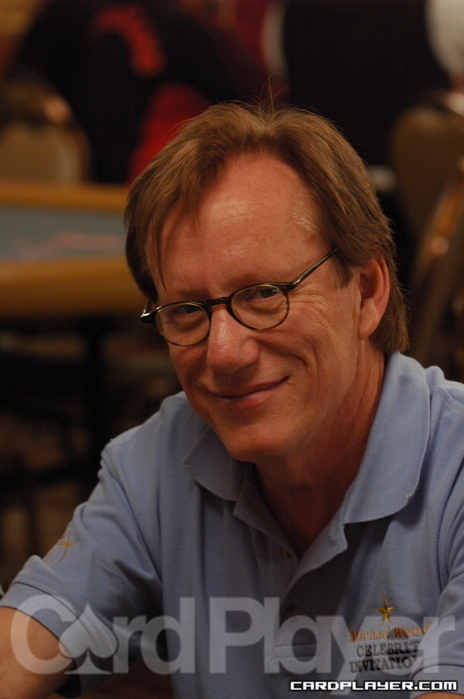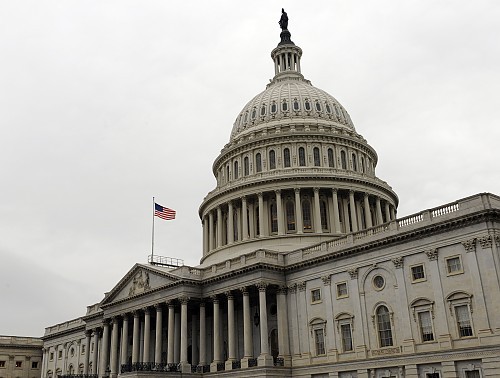






James Woods: 'In Poker, You Become The Casino'WSOP Regular Talks About Love For Game, Online Poker Politics |
|
|

In another life, James Woods could have been the next Chip Reese.
He may be one of Hollywood’s most recognizable veterans, with two Oscar nominations and a Golden Globe under his belt, but the actor has been a familiar face at the Rio during the WSOP for nearly a decade now. When he’s not working, the 67-year-old enjoys driving across the U.S., shooting photography and, of course, playing poker. Despite being a self-described poker enthusiast, Woods remains humble about his skills and considers himself to be an amateur—even in hold’em, his favorite.
With his unending fascination and respect for the game, Woods spends a lot of time honing his skills—oftentimes, while accommodating his fans. When online poker was widely available in the U.S., Woods was a consistent player, and has some choice words for government entities that restrict Americans’ abilities to play online.
On Sunday, Woods was taken to the ER from the Rio after a heart attack scare, but has since recovered, tweeting, “Possible food poisoning with sudden onset of virulent symptoms.”
During last week’s event no. 14 ($1,500 limit Omaha eight-or-better), Woods took the time to talk with Card Player about his personal philosophies on poker, his appreciation for the game, and why the federal government still has an issue with it.
Elaina Sauber: I saw that you recently road tripped across the country. How was that? Was Vegas your final destination?
James Woods: Actually, no, I’m going to Los Angeles. I just bought a house—it’s like a little pied-à-terre that I’m going to have there—and I wanted to get that set up. But I love driving across the country. I very much enjoy doing photography, so I’ll drive, and just stop places and shoot a lot of stuff. Usually, for people who are in my business, or recognizable in the public, you spend a lot of time accommodating your fans, which is something I love to do because I believe they pay my salary…but you constantly sort of do the same thing. You take a picture, talk about show biz, which I’ve talked about quite a bit and I’m a little tired of it, so it’s nice to be in the car for five days and not have to deal with anything.
 ES: So what keeps you coming back to the Rio for the WSOP year after year?
ES: So what keeps you coming back to the Rio for the WSOP year after year?
JW: I just turned 67. I’ve been acting for 46 years; you kind of want to do something a little different…after a certain stage in your life. I’ve been very fortunate and had a lot of great opportunities in acting and film and television…but as a hobby, it’s great to play poker and have a chance to do something. Now, to play in the cash games doesn’t make much sense for me—I mean, I do it once in a while for relaxation—but it’s hard to get excited if you’ve done well in life. I don’t want to play at a really high level…because it’s not about the cash, and people who make a living out of it—I don’t want to hurt them. But a tournament’s great. You do a buy-in and that’s it—now everybody’s equal in terms of their investments. The WSOP in particular is wonderful because it and the World Poker Tour offer you the opportunity to win a salutation, of sorts. For pros, it’s necessary to keep their stature up, but it’s really fun for us amateurs to think we have a chance. Last year, I played in a couple events and got 54th out of like 2300, and came in second in an event.
ES: I’ve read that you don’t consider poker to be gambling. Can you talk a little about why that is?
JW: In poker, if you get skilled enough, the concept is that you become the casino. This is my observation, because these are professionals and I’ll always be an amateur. The nice thing is if you get a pretty good run of cards and you study really well, you’ve got a chance. Not as much of a chance, of course…just because they put more time into the game, they’ve studied the game and they know each other’s strategies. But in poker, your understanding of your situation allows you to make decisions that will, in the long run, give you a positive return on your investment. I can bet in a way that I hope will force my opponent to make bad calls, where he or she is not getting the proper odds to make that call. And if you’re good enough to do it, and you have some degree of luck, over the long run, your positive equity will pay off, just like a casino’s, except their equity is guaranteed because they always have the odds in their favor. You have to engineer the odds to be in your favor by superior play. A top-level professional will always be better than an amateur in the long run…and if that adds up, it’s like compound interest on an investment.
ES: Is that something you’ve experienced more as you’ve continued to play over the years?
JW: Oh, without a doubt. Texas Hold ‘Em is like every woman in every poem by the great poets. It’s a mystery, it’s frustrating, it’s enticing, it’s alluring, it’s a truly, unbelievably complex venture. And what’s really seductive about it is that it looks so simple. I liken it to flying an airplane. I can teach you to fly an airplane in 30 minutes—now I’m going to spend the next 30 years trying to teach you not to crash. I can teach you Texas Hold ‘Em in 10 minutes; to play it as well as these people play, you may never do it, and it may take you a lifetime to master it.
ES: When people see you play, you’re often chatting with the other players and enjoying yourself. Do you think some players don’t embrace the social aspect of the game?
JW: You have to remember, these are professionals making their living. I’ll socialize with people, but when I’m at the table and I’m into a hand, I get very serious. I don’t want to be rude to people, but when they want to talk about things, after about three minutes of it, I always say very politely, ‘Look, I really appreciate this, but let’s not distract the table. I’d like to focus, I’m sure you want to focus so we can win.’ It’s one thing to play a cash game, but in a tournament, you’ve really got to observe everything. You have to…know your game, you have to be in command of your emotional state, have respect for your bankroll, have knowledge about the other players, and not let bad luck and bad results dictate your decision-making process.

JW: I found that many [poker players] are very nice people—smart and nice. Some of them aren’t very nice, and usually those…aren’t very good players. The really good players seem to have a certain confidence. I think they sort of respect me as an amateur who loves the game, has improved…and is working on his game. When they see me take it seriously, especially in tournaments, I think that’s what they respect—that I’ll be social, but then I want to get down to business and really play. I think they take my play seriously if I can get people to sort of stop talking about showbiz and get into playing poker.
ES: What do you think about the political situation surrounding online poker in the U.S.?
JW: What you do with your money—as long as you’re not being cheated—I don’t understand why that’s the government’s business. I’m a very libertarian person. My attitude is, the government shouldn’t tell you that you must wear a helmet on a motorcycle. By the same token, if you’re stupid enough not to wear a helmet, then you shouldn’t ask the government or the emergency room to pay for your medical benefits. As long as you’re not interfering with my life, it’s not my business, unless you’re doing things to others—then I have a moral obligation to act on the behalf of others…but the one thing I know is nobody’s going to die if the federal government lets people play poker because they want to with their own money. I have a right to do whatever I want with my hard-earned money, and I think the only thing the government should do is make sure it’s regulated so that I’m getting a fair shake.
ES: Do you consider poker to be a true American pastime?
 JW: Without a doubt. The only reason [the government] is cautious about it is because they haven’t figured out how to get all the money. The same government that forbids online poker is fine to sanction the worst opportunities in terms of the odds of winning anything, and lets Americans lose all their money on these phony-ass lotteries where you have no chance to win, and off-track betting where people lose all their money—but the government gets it, so it’s okay. And the only reason Sheldon Adelson and all these other people are against it is because they’re afraid if it gets in the hands of the people, the way it should be, and the government isn’t in control over it, then they won’t get all the money. The same way this absolutely sub-standard president we have feels he should be in control of everybody else’s pocketbooks. Bad socialists and bad capitalists have one thing in common: They love other people’s money and they love to spend it. What happened to ‘This is our country, the government’s here to protect us, build some roads and shut up’?
JW: Without a doubt. The only reason [the government] is cautious about it is because they haven’t figured out how to get all the money. The same government that forbids online poker is fine to sanction the worst opportunities in terms of the odds of winning anything, and lets Americans lose all their money on these phony-ass lotteries where you have no chance to win, and off-track betting where people lose all their money—but the government gets it, so it’s okay. And the only reason Sheldon Adelson and all these other people are against it is because they’re afraid if it gets in the hands of the people, the way it should be, and the government isn’t in control over it, then they won’t get all the money. The same way this absolutely sub-standard president we have feels he should be in control of everybody else’s pocketbooks. Bad socialists and bad capitalists have one thing in common: They love other people’s money and they love to spend it. What happened to ‘This is our country, the government’s here to protect us, build some roads and shut up’?
ES: Last week, Nevada’s governor came out in opposition of a bill which would allow placing bets on the presidential and other federal elections. What do you think about that?
JW: The Bill of Rights gives us rights, and implicit in those rights are responsibilities. For example, when Dan Rather and Mary Mapes tried to fix the presidential election in 2000 with that phony story about George Bush about his past service…it was a tragedy that people were trying to fix an election. [Or] like the IRS trying to fix the last election, which they did, by denying the Tea Party organization their basic tax rights, and undermining the value of the election process. It is the fundamentally most important aspect of our government—that people have a right to vote—and that the vote should not be corrupted. I believe if people can gamble [on an election], the sub-corollary to that is, where there’s money, there’s larceny. If you allow election betting, somebody’s going to try to rig an election. If they can rig the World Series [of baseball], they can rig an election. So I’m 100 percent against it.
